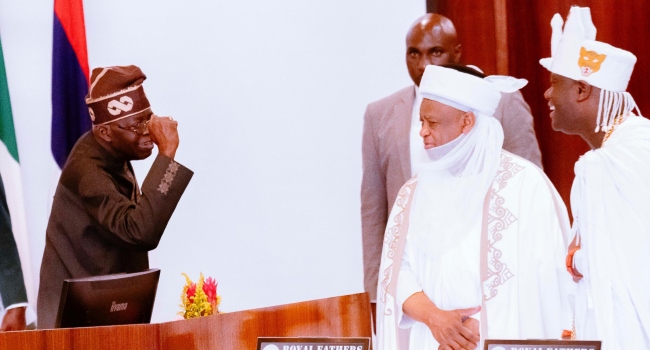As the planned ‘EndBadGovernance’ protest slated for August draws close, President Bola Tinubu on Thursday entered an emergency closed-door meeting with top traditional rulers, security top brass in his government and governors of his party, the ruling All Progressives Congress (APC).
The high-delegation meeting was held at the State House in Abuja, the nation’s capital.
The APC governors were led to the meeting by the Chairman of the Progressives Governors’ Forum and Imo State Governor, Hope Uzodinma.
Some first-class traditional rulers were spotted at the meeting with the President. They include the Ooni of Ife, Oba Enitan Ogunwusi; the Sultan of Sokoto, Muhammadu Saad Abubakar III; and other traditional leaders across the country.
READ ALSO: Protest: Traditional Rulers Call For Patience, Shelving Of Demonstrations
The meeting was also attended by the National Security Adviser (NSA), Nuhu Ribadu; Inspector General of Police, Kayode Egbetokun; as well as ministers and other members of the President’s cabinet.
A delegation of Islamic scholars (Ulamas) later joined the high-powered meeting with the President.
Last-Minute Efforts
Tinubu, former Lagos governor, who was sworn in as President in May 2023, has appealed to displeased youths to shelve the planned ‘EndBadGovernance’ protest slated for next month.
As part of moves to placate aggrieved citizens, the President sent a bill to raise the minimum wage from N30,000 to N70,000 to the National Assembly this week. Both chambers of the legislature speedily passed the bill on Tuesday, awaiting the President’s assent.
READ ALSO: Customs Intercept Smugglers, Seize 41,425 Litres Of Petrol
On Thursday, the military authorities warned that unscrupulous elements plan to hijack the protest and use it to stage anarchy like what was recently witnessed in East African country Kenya.
The police had also warned against bloody demonstrations come next month just as Uzodimma surmised that the protest could be hijacked and turn violent like the EndSARS nationwide protest against police brutality back in October 2020.
The protest against economic hardship, which is gaining traction on social media, has been scheduled to be held across all states of the Federation as well as the Federal Capital Territory (FCT), Abuja, in August. The organisers of the protest have been faceless.
Prices of food and basic commodities have gone through the roof in the last months, as Nigerians battle one of the country’s worst inflation rates and economic crises sparked by the government’s twin policies of petrol subsidy removal and unification of forex windows.
CHANNEL TV
